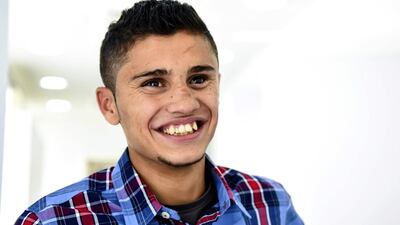DUBAI // A Palestinian teenager has been given renewed hope to pursue his studies after flying to the UAE to be given an artificial eye.
Mamoon Qabha, 17, from a village near Jenin, in the West Bank, lost his left eye in an accident when he was just a year old.
He was suffering from ophthalmia, an inflammatory eye condition, when the Palestine Children’s Relief Fund brought him to Dubai for treatment at Moorfields Eye Hospital. He was fitted with an ocular prosthesis (artificial eye) and is now recovered and back in his village.
“Mamoon will not be able to see through the artificial eye but it will help his facial muscles to develop normally and also help boost his confidence and encourage him to study further.
“People who see him will not be able to make out that this is an artificial eye,” said Mazen Aloul, of the PCRF UAE chapter and who met Mamoon in Dubai last week.
During his stay, the teenager said children had been scared of him when he was younger because he did not have an eye and he felt lonely, isolated and depressed. He had even given up on his studies.
“Mamoon was really looking forward to getting the artificial eye. He now wants to finish high school, study journalism and come back to live in Dubai. The volunteers at PCRF took him to the beach, the malls, the Burj Khalifa and other spots and he fell in love with the city,” said Mr Aloul. After the treatment, Mamoon’s father sent a letter of thanks to the PCRF.
“We hope that this trip will provide Mamoon with an improved quality of life. There are many children with medical conditions coming from conflict areas like Syria, Iraq or Gaza who need medical attention that their families cannot afford or it is not available in their home country, and we help them,” said Steve Sosebee, the chief executive of the PCRF.
“We also hope that by bringing children like Mamoon to the UAE for treatment, they can experience world-class health care and a world outside.”
Dr Edoardo Zinicola, of Moorfields hospital, said: “It is a challenge to be able to see with only one eye, and not being able to pursue your dream because of that. When we learnt of Mamoon’s case, we were looking forward to helping him. We have handcrafted and implanted an ocular prosthesis for him.
“Mamoon suffered a chemical accident when he was just one year old and then underwent multiple surgeries but the eyesight could not be restored. The eye was removed when he was a child.”
Dr Andrea Sciscio, a consultant ophthalmic and oculoplastic surgeon, said it took a week and several visits to the hospital by Mamoon to match the size, colour and shape of his working eye.
“An ocular prosthesis, or artificial eye, works to help build the self-esteem of the individual, as the look and feel replicates that of a normal eye, helping the child lead a fuller life, with a sense of normality,” said Dr Sciscio. “His biggest problems were fitting in and feeling like a teenager due to the different way that he looked.”
With the lack of advanced medical equipment and know-how in the West Bank, and travel not financially viable, many children do not receive the treatment they would expect to receive in other parts of the world.
The children’s relief fund is a non-political, non-profit organisation that offers travel and treatment to sick and injured Arab children.
“We have been facilitating the treatment of children since 2006 in the UAE and usually between five and 10 children come to the country for treatment every year,” Mr Aloul said. “The end result is rewarding. There are hundreds of children who need help in Palestine, Syria and Iraq and we want to reach out and be able to help more children.”
More than 70 children have been treated in the UAE as a result of PCRF’s efforts.
arizvi2@thenational.ae


